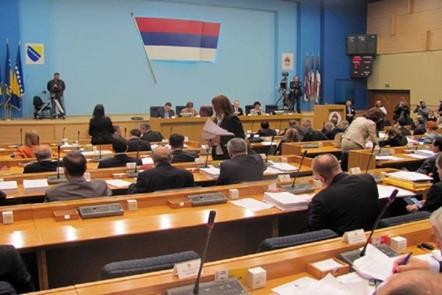Speeches Shim

September 2017 – Citizens in Bosnia and Herzegovina (BiH) cite corruption by public officials and institutions as the second worst problem in the country, next to the lack of jobs. The corruption occurs secretly, behind closed doors. But it does not occur invisibly. Sometimes there are witnesses.
Often those witnesses are afraid to come forward to say what they’ve seen. But in Republika Srpska (RS), one of two entities in BiH, they can now come forward without the risk of retribution. They are protected by the new whistleblower law.
Corruption is pervasive and corrosive in BiH, which impedes development and undermines the country’s potential for EU accession. Public officials often operate public institutions in BiH as if they were their own private companies, and the institutions are prone to patronage and nepotism. Public spending is often not transparent which allows for secret arrangements to be made.
Whistleblowing is one of the most direct methods of detecting and exposing corruption – whether it’s bribery, fraud, theft of public funds, or other acts of wrongdoing. Employees in public institutions who see corruption may want to ‘blow the whistle’ but without legal protection, they fear retaliation if they do. The experience of Spomenka Mekic from Banja Luka, in the RS, is a case in point.
In 2012, Spomenka had worked for six years at the RS Protection Fund (which processes insurance claims the entity Insurance Agency) when she discovered that the Fund director at the time had been falsifying court fees in financial reports. She raised the issue with the director and later reported it to the police. Soon after that, her troubles began: her salary was reduced, she was harassed, and in 2016 she was abruptly terminated from her job.
Before 2017, there was only one whistleblower protection law in force in BiH: the state law. (USAID’s political party and anti-corruption programs championed adoption of the state law in 2014.) But that law applies to only 10 percent of BiH public institutions and servants. Public employees at the entity levels are not covered by the state law.
“Since passage of the [state-level] law, we have received dozens of requests for protective status to people who reported corruption. However, it is important that similar mechanisms are applied at the entity level,” the director of the BiH Anti-Corruption Agency said.
On June 15, 2017, whistleblower protection was expanded to one of those entities with passage of a law in Republika Srpska. The new RS law allows external reporting of corruption to civil society organizations, exempts whistleblowers from court fees (if allegations prove to be correct), and reduces the statutory timeframe for courts to respond to whistleblower disclosures.
USAID’s ACCOUNT Project worked closely with the RS Ministry of Justice to help draft and advocate passage of the law, and the main ACCOUNT recommendations were included in the final law.
“I'm certainly looking forward to this law,” Spomenka Mekić said. “People who, like me, are brave enough to report illegal activities are rare, because they are afraid of the retribution I was exposed to. With this law in place, citizens’ working rights will be protected.”
Through its Anticorruption Civic Organizations’ Unified Network (ACCOUNT) project, USAID continues to provide legal assistance and support to whistleblowers and victims of corruption in BiH (see story here).

Comment
Make a general inquiry or suggest an improvement.